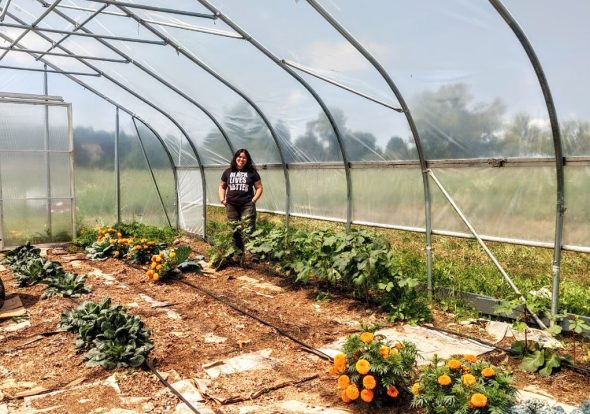
Local resident Amanda Duprey Hernandez stood in the high tunnel greenhouse where they have begun farming as Finca Taína on the grounds of Agraria. (Photo by El Mele)
Growing local at Finca Taína
- Published: September 6, 2024
By El Mele
Local resident Amanda Duprey Hernandez has begun farming a new plot at the Agraria Center for Regenerative Practice thanks to grants from two nonprofits, Hall Hunger Initiative and the Yellow Springs Community Foundation.
Hernandez, who is originally from Puerto Rico, has established the new plot at Agraria under the name Finca Taína (pronounced fin-ka tuh-een-uh), and told the News in a recent interview that the name honors the native people of Puerto Rico.
“They were the Taínos, and they spoke Taíno, which is an Arawaken language,” Hernandez said. “Finca Taína means ‘Taíno Farm’ in Spanish.”
Having obtained a bachelor of arts degree in global security studies with a focus in human security from Temple University, Hernandez moved to Yellow Springs to serve in an AmeriCorps VISTA position at Agraria, working to increase food security in the Miami Valley region. At the end of their VISTA term, Hernandez was hired by Agraria as the full-time farm coordinator, a position they held until Agraria’s closure in February 2023.
Now, Hernandez is studying to become a paralegal, and also works part-time at downtown restaurant MAZU and at Hall Hunger Initiative, or HHI, which is located on the grounds of Agraria. Hernandez said they spend about 20 hours weekly providing bookkeeping services for HHI, and about 10 hours weekly farming the new farm plot; a paid intern assists in working the plot.
In the future, Finca Taína aims to supply village eateries with locally grown food — a goal that runs parallel to the mission of funding agency HHI, which “works with community partners to build a just and sustainable food system,” according to the nonprofit’s website.
HHI works toward its mission, in part, by providing microgrants, microloans and sponsorships for local food system projects overseen by other nonprofits, and for local restaurants and food trucks. Specific microgrants, such as the one Hernandez was awarded, are a part of HHI’s General Support for Local Growers program and are given to local farmers and growers, prioritizing those who are BIPOC and members of the LGBTQIA+ community.
“We recognize for a person of color or a transgender person trying to start a farm, their ability to access the capital that they need is going to be drastically different than a traditional rural American white farmer, and we’ve seen that discrimination at the USDA level,” said HHI staff member Alexandra Klug in a recent interview. “The capital to get a piece of equipment can make or break a farm, and there are plenty of local farmers and growers in Dayton and the Miami Valley who need a little funding to get off the ground, which then sets them up for success so they can start making money and continue their projects on their own.”
HHI’s General Support for Local Growers program’s $3,000 microgrant paid for most of the infrastructure of Finca Taína’s farming venture, including new soil, seeds and water deliveries for the season. A $2,400 grant from the Yellow Springs Community Foundation aided in paying for a $3,000 water tank. Hernandez pays for supplies out of pocket.
Hernandez has established their new plot under a high tunnel — a kind of moveable greenhouse — which allows for growing nearly year-round. The typical growing season in Ohio runs from around April to October; a high tunnel can help extend the growing season to as early as February and as late as December. This will be especially helpful for Hernandez, as the availability of grant funding pushed planting to May this year, and a steady source of water wasn’t available until June.
The high tunnel belongs to Agraria and was paid for by a grant from the USDA’s Environmental Quality Incentives Program, or EQIP.
Hernandez said they began farming because, in order to remain in compliance with the EQIP grant, Agraria needed to continue farming within the high tunnel. Hernandez was originally hired to provide bookkeeping services for both HHI and Agraria — but then Agraria’s Interim Manager Eric Bee asked who would be best suited to continue growing in the high tunnel.
“Everyone mentioned me,” Hernandez said. “So Agraria got a separate bookkeeper, and I took my 10 hours to turn to farming instead. I did it because I still believe in Agraria’s mission and didn’t want them to fall out of compliance with the EQIP grant. Plus, I was able to build up the soil and keep anything I grew for my own profit while helping Agraria out.”
After the high tunnel was moved during reorganization of some of the farm’s Huston Road structures, a new area needed to be propagated for future growers. In exchange for using the high tunnel for free from Agraria for one year, Hernandez will spend the first year of Finca Taína’s operation, in part, enriching the soil of their new plot.
“The first year isn’t nearly as productive because it takes a while for the soil to heal and grow — it should be seen as establishing the new space before leasing it,” Hernandez said. “Even if I don’t make a bunch of sales, I feel OK knowing that I built up the soil for future use.”
In May, volunteers donated their time to setting up the high tunnel, weeding and laying leaf mulch. Locals also answered Hernandez’ call for cardboard to create a weed barrier, and New Lebanon-based mushroom farm Guided by Mushrooms donated used mushroom cultivation soil blocks. Since then, Hernandez has seen earthworms and mushrooms growing out of the soil — both indicators of good soil health.
A new 1,100-gallon water tank is positioned at the back of the high tunnel and feeds into drip lines that are placed next to the beds, so the water goes directly into the roots. This curtails wasted water or overwatering and prevents splashing soil onto greens, which keeps them safe to eat.
Hernandez is growing a unique variety of produce, including cabbage, crimson okra, leeks, onions, eggplant, tatsoi and more than 15 varieties of various colored sweet potatoes.
“I’m a specialty farmer,” Hernandez said. “I grow things you’re not going to find at a farmers market.”
Finca Taína’s produce will be sold to local restaurants, including MAZU. Any remaining food will be donated to HHI partners, such as the twice-weekly “Who’s Hungry?” free meal program hosted at MAZU by Carl Moore and Jim Zehner, and Xenia’s One Bistro, which offers meals to all on a “pay what you can” model.
“I believe in a strong local food system, and since I also work for MAZU, I knew I could grow things for the restaurant, keeping my produce local and having a distribution point that didn’t compete with the other local farmers at the farmers market,” Hernandez said.
Currently, because only Hernandez and an intern are working the farm plot, Finca Taína is using half of the high tunnel to grow produce; the second half will grow a cover crop as a way to enrich the soil. Hernandez will then plant the cold-season crops into the cut-down cover crop when the time is right. At that point, the first half of the high tunnel may be planted with its own cover crop.
“The biggest thing about farming is it’s a giant science experiment,” Hernandez said. “You figure out what works and what doesn’t work, and you make a note of that.”
Hernandez is also one of the founding members of the BIPOC Food and Farming Network, or BFFN, the office of which is also located on the Agraria grounds.
The BFFN was recently granted independent 501(c)(3) nonprofit status and, thanks to another grant from the YS Community Foundation, will hire Jeffrey Steed CPA of Unitary Accounting, a Black-owned business in Dayton. Steed has offered his services to BFFN for one year at a heavily discounted rate, which will include the preparation of the nonprofit’s 2024 and 2025 tax returns, as well as training for various members of BFFN administration in bookkeeping and accounting processes. The News will follow up with the BFFN next month, ahead of its annual Black Farming Conference.
*The author is a student at Antioch College and a freelance reporter for the News.
The Yellow Springs News encourages respectful discussion of this article.
You must login to post a comment.
Don't have a login? Register for a free YSNews.com account.













No comments yet for this article.